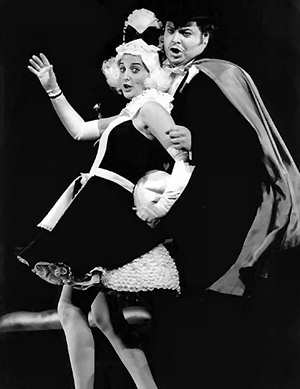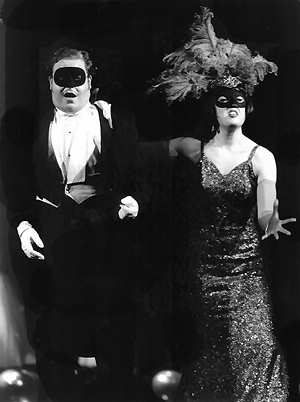Strauss, Die Fledermaus: Royal College of Music Opera Orchestra, Soloists,
cond. Michael Rosewell,
directed by Paul Curran, Britten Theatre, Royal College of
Music, 19.11.2005 (ME)

I
go to operettas about as often as I go to musicals; that is
to say, never, but I made an exception in the case of this
first night at the RCM, since the College has never disappointed
me when it comes to staging original productions sung by future
stars. My reasons for disliking this type of work are the
same ones which cause me to mentally absent myself during
large stretches of, for example, ‘Rosenkavalier’ – I cringe
at all that ‘Nein nein, ich trink
kein Wein’ stuff but am willing
to endure it for the sublime opening scene, first fifteen
minutes of the second act and final trio: the music of ‘Fledermaus’
never touches the sublime for me, so I stay away. To do so
would have been a mistake on this occasion, as you might expect,
since this extravagantly lively, witty production succeeded
triumphantly in banishing all notions of the usual embarrassment.
The
big problem with this work is of course the necessity for
full-blown operatic quality in the singing combined with straight-theatre
expertise in the delivery of the dialogue, so that one is
likely to be offered either starry but not exactly sparklingly
quick – witted singers, or scantily gifted singing actors.
All this is brushed aside in the RCM’s version, which unites
some genuine future stars of the operatic world with a director
whose gift for personenregie is matched by his skill in the
manipulation of dialogue-delivery. Any ‘Fledermaus’
must begin with a superlative Rosalinde,
and we had that in Anna Leese, one
of the RCM’s brightest stars: Anna won the 2005 Richard Tauber
award, part of the prize of which is a Wigmore
Hall recital – not to be missed on any account. Hers is a
big, bright, gleaming soprano with richly coloured lower notes,
and she uses it with taste and confidence beyond her years:
one might think it rather cruel of a director to place a student
singer atop a grand piano for the Czardas, but she
carried it off with aplomb.

The
RCM has two other stars in the Orlovsky
of Anna Grevelius and the Adele of Kim Sheehan: Anna sang her music
with real flair, making light of the challenging ‘Ich
lade gern mir
Gäste ein’, and presenting a genuinely funny portrayal of
this adolescent aristo. Kim was
a glamorous, feisty Adele, who almost – but not quite – persuaded
me that this character does not belong right up there with
Olga, Mariandel and Oskar in the ‘most irritating operatic character’ list.
The
men were perhaps less remarkable, but there were still many
promising voices to be heard: Andrew Staples is another major
prizewinner whose career looks set
to be a stellar one, and his Eisenstein, whilst lacking in
that last ounce of panache at present, was a credibly odious
fellow in his rather Sloane-y loucheness:
Andrew’s voice is a very beautiful one, ideally suited to
Mozart, and one can anticipate his Ferrando (for the Classical Opera Company) with pleasure.
George Matheakakis was a very confident
Frank, with a rich, burnished baritone voice and a stage presence
to match, and Shaun Dixon revealed an agile, at times quite
Italianate tenor as Alfred – I loved his snatches of ‘E lucevan
le stelle’ from the prison cell.
Simon Lobelson’s Falke was another confident performance: he is a student of
Roderick Earle, which shows in his phrasing and vocal production.
As
ever with the RCM, the smaller parts offered much to savour:
Nathan Vale’s Dr. Blind, Katherine Manley’s Ida and especially
Philip Shakesby’s Frosch
were all enjoyable characterizations and fine singing performances,
and the ‘auditions’ at Orlovsky’s
party were the showcase for even more excellence - I wish I could single them out by name, but
just to highlight two of the most notable, the young lady
who began the ‘Can’t help lovin’
that man’ sequence and the very tall bass who sang ‘Old Man
River’ are both surely destined for future greatness.
And Paul Curran’s production? Sheer joy, from start to finish.
The Eisenstein’s house is simply but tellingly represented
by a huge Lempicka - style backdrop: Paul Edwards’ designs are consistently appropriate
and stylish – a single sofa, judiciously chosen flowers, and
most of all carefully planned movement which allows characters
to present their flaws and foibles yet never interferes with
their singing. The second act overflows with colour, fun and
immediacy – it’s so much better, of course, to have a young
cast here, and these partygoers represent a vibrant, carefree
world to perfection. Set design again was ideally matched
to the production style, with a striking colour palette of
white dresses offset by red ballet shoes and Rosalinde’s
slinky scarlet gown, plenty of balloons and of course champagne
– why, I almost enjoyed it all!
Michael
Rosewell worked his now-habitual
wonders in the pit – if I didn’t loathe all that so-called
‘Viennese Schwung’ I’m sure I would
have loved all those waltzes, but even my prejudiced ear was
delighted with the aptly zippy, beautifully shaped phrasing
and the downright excellent playing. Full marks all round
– I’m such a curmudgeon that I’d be happy for the RCM to give
me a constant diet of Britten and Handel, but if I have to
attend the odd bit of froth, then this is about as good as
it gets.
Melanie
Eskenazi




